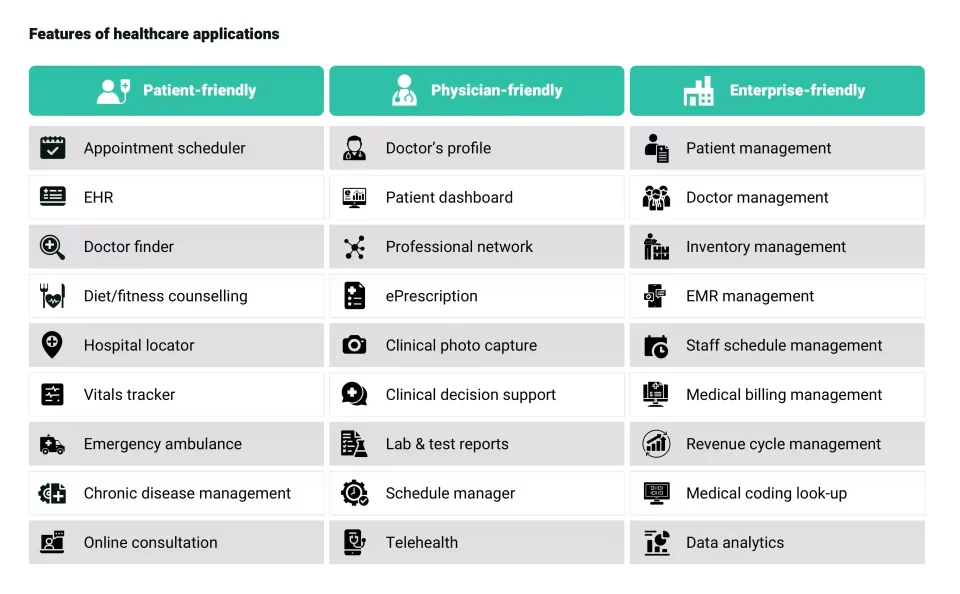INTRODUCTION
Essential features in customized healthcare apps
The digital front door is a critical component of modern care journeys. The most successful digital health products seamlessly link patients to providers, make it easier for them to access services, and empower them to take a more active role in the management of their treatment.
What features should healthcare apps have? This article’s got you covered.
Custom healthcare apps are becoming increasingly popular with physicians and providers, but not all solutions are equal, and the stakes are high. When digital health products do not delight their respective end-users, reclaiming the lost market share is impossible.
In 2022, the digital health market was valued at over $200 billion. It is projected to grow at a compound annual growth rate (CAGR) of 18% between 2023 and 2030. Investment is flooding the industry, and ensuring your digital product includes the right medical software features is more important than ever.
Please keep reading to learn the must-have features to build into your organization’s digital health apps for physicians and their patients.
Incorporate these essential features when developing your healthcare app, no matter which type of app you are developing.
TYPES
Popular types of healthcare apps
For many years, healthcare has been resistant to change. Interactions with patients were one-sided, and many provider networks could maintain a competitive advantage despite delivering sub-par customer service.
In today’s health marketplace, building seamless consumer journeys and striving to provide physicians with the tools they need to deliver more efficient and personalized medical services are top of mind. Different types of healthcare apps present the opportunity to give people what they want and the tools doctors need to reach new degrees of excellence in pursuit of the quadruple aim of healthcare: reducing costs, improving population health, patient experience, and healthcare team well-being. The following are some types of healthcare apps:
- Urgent care or emergency room apps: Route patients to the nearest emergency care with directions, travel time, waiting period, etc.
- Healthy lifestyle apps: It includes all the tracking apps –be it fitness, diet, pregnancy, baby development, exercise regimen, healthy nutrition etc.
- General hospital apps: Customized apps for hospitals that provide doctor information, a video tour of the hospital, a list of facilities available, specialists, and an appointment scheduler.
- Chronic disease management apps: These apps provide those with chronic diseases like diabetes, high blood pressure, cancer, and so on need a communication channel with their doctors.
Custom healthcare apps represent the best opportunity for healthcare organizations to truly zero in on end-users' pain points to release world-class digital products to dazzle and delight. Healthcare mobile app features should not be an afterthought but a galvanizing opportunity for organizations to leverage technologies to transform healthcare as we know it.
PROVIDERS
Healthcare app features for doctors
Medical providers experienced massive burnout, turnover, and staff shortages due to the COVID-19 pandemic. Digital health strategy consulting presents a unique opportunity for enriching healthcare professionals’ workflows and clinical efficiency while streamlining tasks with automation and other advanced data-driven capabilities.
Here are the top healthcare app features for doctors:
EHR/EMR integration
In 2014, the American Recovery and Reinvestment Act mandated the adoption of EHRs (electronic health records) and EMRs (electronic medical records). The largest providers secured EHR/EMRs, but many mid and small-sized practices still need to switch.
EHR/EMR integration is a critical digital health app because it ensures that personal health information, clinical data, and compliance-related documentation are easier to manage and maintain.
Additionally, by optimizing the functionality of EHR/EMR solutions, doctors are more likely to use their services to drive better patient health outcomes.
E-prescriptions
As web portal development services advance, there is more reason to integrate core functions that allow providers to handle more workflows within singular services. E-prescription features enable doctors to automate prescriptions so that all documentation is completed with the click of a button, saving organizations time and money.
E-prescribing software solutions help healthcare stakeholders to communicate, exchange patient information, and fulfill compliance obligations. Custom healthcare apps for providers should offer this feature.
HIPAA compliance
Few regulatory guidelines are more influential in the healthcare industry than HIPAA compliance and for a good reason.
In recent years, the industry has been under attack by cyber criminals, and losses of patient records lead to losses in reputation and heavy fines.
HIPAA-compliant medical software needs to be baked into all digital health solutions.
Cloud integration
The vast cloud migration across the healthcare space powers digital acceleration at scale. SAAS solutions have become the norm, and cloud integration is the key to reducing the need for expansive server space in physical infrastructure.
However, cloud integration needs to be well thought out and organized in a way that delivers the utility organizations need, to be matched with the security required, to ensure organization data is not vulnerable to attack.
Patient monitoring
One of the most exciting areas of innovation in healthcare and medical practice settings is the rise in remote patient monitoring toolkit.
The need for these healthcare app features will increase exponentially in the coming years as more healthcare networks adopt a hub and spoke-based approach to shift services directly into patients’ homes and smaller clinical settings.
 Healthcare applications should cater to patients, doctors, and healthcare institutions
Healthcare applications should cater to patients, doctors, and healthcare institutions
PATIENTS
Healthcare app features for patients
Healthcare app features for patients should help them take advantage of your organization’s services and delight them with an experience that matches their expectations after shifting from the apps produced by Fortune 500 companies.
Choosing a medical professional
First and foremost, digital health tools for patients connect patients with their doctors. People can only access services they know about.
That is why it is critical for your apps to make patient care journeys easy for people of all ages and levels of digital literacy.
Appointment scheduling
After connecting with providers, the next step in patient-consumer care is to schedule appointments, send secure messages, and receive notifications to remind patients when to see their - doctors virtually or in person.
These tools must be implemented with care so that the appointment scheduling feature genuinely helps your patients access the needed services.
Accessing the medical community
One of the most critical healthcare app features connects patients with the broader community health network and medical community. When patients begin their care journey, they may not know whom they need to see.
That is why features like FAQs, databases of common patient questions and answers, or a very well-thought-out information architecture play a vital role in linking different providers and touchpoints in the community health system.
Wellness tracking
One of the new foundations of healthcare is the pursuit of preventative care. When patients do many little things right, it often helps them avoid more significant and costly interventions. Wellness tracking can involve tools to track biomarkers and step counts and record time spent exercising, drinking water, or otherwise following preventative guidelines.
Integration with other medical devices
Few topics have gained traction across the medical landscape in recent years than the need to pursue true interoperability. Services need to be able to work and play alongside each other without leading to massive increases in IT human capital or expenditure. Healthcare app features must support integration with other tools and services across the end-to-end digital health ecosystem.
ATTRIBUTES
What else to consider when developing a healthcare app
Designing award-winning digital health solutions takes a pragmatic approach. Beyond a rich feature set that delights patients and providers, consider these key attributes:
Payment gateway
Digital payment processing solutions vary. It is important to build a solution that will match your organization’s needs, obligations to payers, and regulatory compliance demands, among many other concerns.
UI/UX design
Your solution needs to look and feel amazing. Providers and patients will not stick around using digital health services that do not match their UI/UX healthcare needs. The marketplace is competitive and becoming even more so as patients and doctors reject systems that do not offer the utility their end users need.
Data security
Every digital product needs to be built with data security, governance, and ease of usage across a remote landscape first and foremost. Failure to pursue this will place your organization in a vulnerable position down the line.
API integration
Your solution needs to be able to interact and share information with other services. API integrations need to promote ease of use and accessibility.





